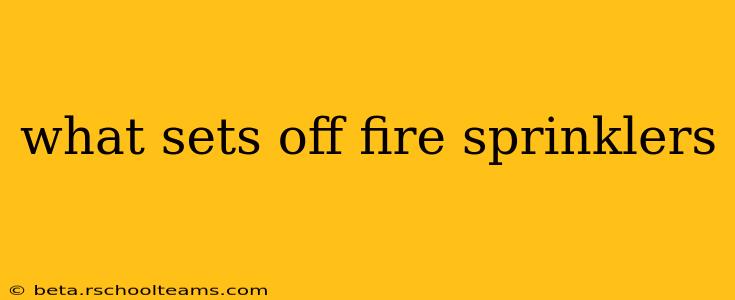Fire sprinklers are a crucial component of fire safety systems, designed to suppress fires quickly and efficiently. But what exactly triggers these life-saving devices? Understanding the mechanism behind their activation is key to appreciating their effectiveness. This article will delve into the specifics of sprinkler activation, addressing common questions and misconceptions.
How Do Fire Sprinklers Work? The Basics
At their core, most fire sprinklers utilize a simple yet ingenious mechanism: thermal activation. Each sprinkler head contains a small glass bulb or a fusible link, both sensitive to heat. When the surrounding temperature reaches a critical threshold (typically around 135-165°F or 57-74°C, depending on the sprinkler type), the bulb breaks or the link melts, releasing water under pressure. This initiates the localized suppression of the fire. Crucially, only the sprinkler heads directly exposed to the fire's heat will activate—not the entire system. This ensures efficient water usage and minimizes unnecessary damage.
What Temperature Sets Off a Fire Sprinkler?
The specific temperature at which a fire sprinkler activates varies depending on the type of sprinkler head installed. As mentioned above, the most common types have activation temperatures ranging from 135°F to 165°F (57°C to 74°C). However, there are also sprinkler heads designed for higher temperatures, used in specific applications where lower temperatures might trigger false alarms. The choice of sprinkler head is determined during the fire safety system design process, taking into account the specific risks and conditions of the building.
What Else Besides Heat Can Set Off Fire Sprinklers?
While heat is the primary trigger, other factors can inadvertently activate a sprinkler head, although these are less common. These include:
- Physical Impact: A forceful impact, such as a dropped heavy object, could theoretically break a sprinkler's glass bulb. However, these are designed to withstand normal impacts.
- Corrosion: Over time, corrosion could weaken a fusible link or glass bulb, making it more prone to premature activation. Regular sprinkler system inspections are essential to prevent this.
- Manufacturing Defects: While rare, manufacturing flaws in the sprinkler head itself could lead to malfunction and premature activation. Proper installation and quality control minimize this risk.
- Incorrect Installation: Improper installation of the sprinkler system could create weak points or expose the heads to excessive heat or other conditions leading to unintended activation.
It is important to note that while these factors could theoretically trigger a sprinkler, they are far less likely than the heat generated by a fire.
Can a Small Fire Set Off a Fire Sprinkler?
The short answer is: it depends. A very small, contained fire might not generate sufficient heat to activate a sprinkler, particularly if it's quickly extinguished. However, a fire that is growing rapidly will generate enough heat to quickly reach the activation temperature of the sprinkler heads in its immediate vicinity.
Do All Sprinklers Activate at the Same Time?
No, absolutely not. One of the key advantages of sprinkler systems is their localized response. Only the sprinkler heads directly exposed to the heat and flames will activate. This targeted approach minimizes water damage and conserves water resources.
How Often Should Fire Sprinklers Be Inspected?
Regular inspection and maintenance of fire sprinkler systems are crucial for ensuring their proper functioning. The frequency of inspections often depends on local building codes and regulations, but generally, annual inspections are recommended. These inspections check for corrosion, damage, and obstructions, ensuring the system is ready to respond in the event of a fire.
This detailed explanation provides a comprehensive understanding of fire sprinkler activation. Remember, always consult with qualified fire safety professionals for any concerns or questions regarding your sprinkler system. They can offer tailored advice based on your specific building's needs and local regulations.
